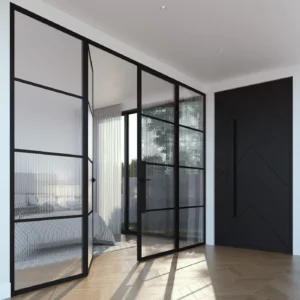Using iron doors for historical renovations offers several advantages:
- Historical Authenticity: Iron doors are often consistent with the architectural styles and design elements of historical buildings, providing an authentic look and feel that complements the overall aesthetic of the structure.
- Preservation of Heritage: Iron doors contribute to the preservation of historical buildings by maintaining the original character and charm of the property. They help retain the historical integrity of the structure while ensuring its longevity for future generations to appreciate.
- Durability and Longevity: Iron doors are renowned for their durability and longevity, wholesale iron doors making them suitable for historical renovations. Their robust construction ensures that they can withstand the test of time and remain in excellent condition even after decades of use.
- Customization Options: Iron doors offer a wide range of customization options, allowing architects and designers to tailor the design, size, and features to match the specific requirements of the historical renovation project. This flexibility ensures that the iron doors seamlessly integrate with the existing architecture.
- Security and Protection: Iron doors provide enhanced security and protection for historical buildings, deterring vandalism, break-ins, and unauthorized access. Their solid construction and sturdy locks help safeguard valuable artifacts, artwork, and historical treasures housed within the building.
- Energy Efficiency: Modern iron doors can be equipped with energy-efficient features such as insulated glass panels and weather-stripping to improve thermal performance and reduce energy costs. This ensures that historical buildings remain comfortable and energy-efficient without compromising their architectural integrity.
- Low Maintenance: Iron doors require minimal maintenance and upkeep, making them ideal for historical renovations where preserving the original materials and features is paramount. Routine cleaning and occasional painting or sealing are typically all that’s needed to keep iron doors looking their best.
- Adaptability to Modern Needs: While iron doors maintain the historical charm of a building, they can also be adapted to meet modern functional requirements. For example, they can be fitted with modern locking mechanisms, accessibility features, iron door manufacturer and automation systems without compromising their vintage appeal.
- Value Enhancement: Installing iron doors as part of a historical renovation project can enhance the value of the property by preserving its historical significance and character. Historical buildings with well-maintained iron doors often command higher resale values and attract discerning buyers and tenants.
Overall, the advantages of using iron doors for historical renovations include historical authenticity, preservation of heritage, durability, customization options, security, energy efficiency, low maintenance, adaptability to modern needs, and value enhancement. These factors make iron doors a preferred choice for restoring and revitalizing historical buildings while honoring their rich architectural legacy.
How do iron doors contribute to the overall value of a property?
Iron doors contribute to the overall value of a property in several ways:
- Enhanced Curb Appeal: Iron doors add visual appeal and sophistication to a property’s exterior, China iron glass door creating a striking first impression for visitors and potential buyers. Their elegant design and timeless appeal can significantly enhance the overall aesthetic of the property.
- Increased Security: Iron doors provide enhanced security features such as sturdy construction and robust locking mechanisms, which can improve the safety and security of the property. This added layer of security is often appealing to homeowners and can increase the perceived value of the property.
- Durability and Longevity: Iron doors are known for their durability and longevity, requiring minimal maintenance compared to other types of doors. Their resistance to weather, pests, and wear and tear ensures that they retain their functionality and appearance over time, contributing to the long-term value of the property.
- Energy Efficiency: Modern iron doors can be equipped with energy-efficient features such as insulated glass panels and weather-stripping, improving thermal performance and reducing energy costs. This can be attractive to buyers looking for energy-efficient homes and can increase the overall value of the property.
- Customization Options: Iron doors offer a wide range of customization options in terms of design, size, finish, and features. Homeowners can personalize their iron doors to match their unique style preferences and architectural aesthetics, enhancing the overall value and appeal of the property.
- Historical Significance: In historical properties or neighborhoods, iron doors can contribute to the preservation of architectural heritage and historical authenticity. The presence of well-maintained iron doors can enhance the historical charm and character of the property, China iron glass door manufacturers increasing its value in the eyes of buyers who appreciate historical significance.
- Low Maintenance: Iron doors require minimal maintenance and upkeep, making them a practical and cost-effective investment for homeowners. Their durable construction and resistance to corrosion and damage mean that they retain their value over time without the need for frequent repairs or replacements.
- Market Demand: Properties with iron doors may attract more attention from buyers due to their perceived value and desirability. In real estate markets where iron doors are considered desirable features, properties with these doors may command higher sale prices and shorter listing times.
Overall, iron doors can significantly enhance the overall value of a property by improving curb appeal, increasing security, providing durability and longevity, offering energy efficiency, providing customization options, preserving historical significance, requiring low maintenance, and appealing to market demand.
